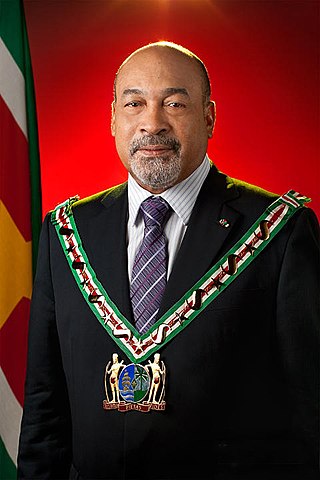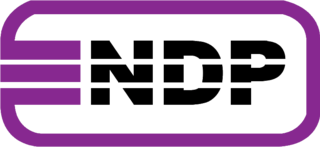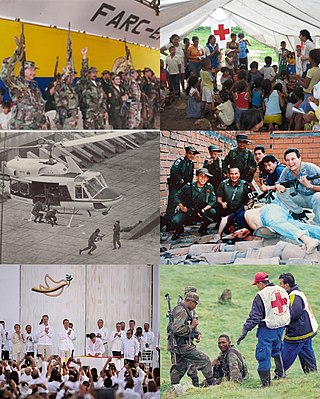Related Research Articles

Suriname, officially the Republic of Suriname, is a country in northern South America, sometimes considered part of the Caribbean and the West Indies. Situated slightly north of the equator, over 90% of its territory is covered by rainforests, the highest proportion of forest cover in the world. Suriname is bordered by the Atlantic Ocean to the north, French Guiana to the east, Guyana to the west, and Brazil to the south. It is the smallest country in South America by both population and territory, with around 612,985 inhabitants in an area of approximately 163,820 square kilometers. The capital and largest city is Paramaribo, which is home to roughly half the population.
The early history of Suriname dates from 3000 BCE when Native Americans first inhabited the area. The Dutch acquired Suriname from the English, and European settlement in any numbers dates from the 17th century, when it was a plantation colony utilizing slavery for sugar cultivation. With abolition in the late 19th century, planters sought labor from China, Madeira, India, and Indonesia, which was also colonized by the Dutch. Dutch is Suriname's official language. Owing to its diverse population, it has also developed a creole language, Sranan Tongo.

Desiré Delano Bouterse is a Surinamese military officer, politician, convicted murderer and drug trafficker who served as President of Suriname from 2010 to 2020. From 1980 to 1987, he was Suriname's de facto leader after conducting a military coup and establishing a period of military rule. In 1987, Bouterse founded the National Democratic Party (NDP). On 25 May 2010, Bouterse's political alliance, the Megacombinatie, which included the NDP, won the parliamentary elections, and on 19 July 2010, Bouterse was elected as President of Suriname with 36 of 50 parliament votes. He was inaugurated on 12 August 2010.

The National Democratic Party is a political party in Suriname. It was founded on 4 July 1987 by Surinamese leader Dési Bouterse, and was one of the first parties in the country to have a stable base of support across different ethnic groups. In the 2015 general election the party scored 45.56% of the vote and 26 of 51 seats in parliament.

The Colombian conflict began on May 27, 1964, and is a low-intensity asymmetric war between the government of Colombia, far-right paramilitary groups and crime syndicates, and far-left guerrilla groups, fighting each other to increase their influence in Colombian territory. Some of the most important international contributors to the Colombian conflict include multinational corporations, the United States, Cuba, and the drug trafficking industry.
The December murders were the murders on 7, 8, and 9 December 1982, of fifteen prominent young Surinamese men who had criticized the military dictatorship then ruling Suriname. Thirteen of these men were arrested on December 7 between 2 am and 5 am while sleeping in their homes. The other two were Surendre Rambocus and Jiwansingh Sheombar who were already imprisoned for attempting a countercoup in March 1982. Soldiers of Dési Bouterse took them to Fort Zeelandia, where they were heard as "suspects in a trial" by Bouterse and other sergeants in a self-appointed court. After these "hearings" they were tortured and shot dead. The circumstances remain unclear. On 10 December 1982, Bouterse claimed on national television that all of the detainees had been shot dead "in an attempt to flee".
Moleson Creek is a community on the Corentyne River in the East Berbice-Corentyne region of Guyana, and home to the Guyana-Suriname ferry stelling. It is north of Orealla Mission, 10 km (6.2 mi) south of Corriverton, and approximately 90 km (56 mi) from New Amsterdam.
Illegal drug trade in Venezuela is the practice of illegal drug trading in Venezuela. Venezuela has been a path to the United States for cocaine originating in Colombia, through Central America and Mexico and Caribbean countries such as Haiti, the Dominican Republic, and Puerto Rico. In the 2010s, Venezuela also gradually became a major producer of cocaine.

Jules Sedney was a Surinamese politician, and Prime Minister of Suriname from 20 November 1969 to 24 December 1973. In 1980, he became governor of the Central Bank of Suriname, but had to flee the country in 1983 after a dispute with Dési Bouterse. Sedney returned to Suriname in 1989.

The 1980 Surinamese coup d'état, usually referred to as the Sergeants' Coup, was a military coup in Suriname which occurred on 25 February 1980, when a group of 16 sergeants of the Surinamese Armed Forces (SKM) led by Dési Bouterse overthrew the government of Prime Minister Henck Arron with a violent coup d'état. This marked the beginning of the military dictatorship that dominated the country from 1980 until 1991. The dictatorship featured the presence of an evening curfew, the lack of freedom of press, a ban on political parties, a restriction on the freedom of assembly, a high level of government corruption, and the summary executions of political opponents.

Ronnie Brunswijk is a Surinamese politician, businessman, former rebel leader, footballer and convicted drug trafficker, who is serving as the current Vice President of Suriname.
Colombia has a high crime rate due to being a center for the cultivation and trafficking of cocaine. The Colombian conflict began in the mid-1960s and is a low-intensity conflict between Colombian governments, paramilitary groups, crime syndicates, and left-wing guerrillas such as the Revolutionary Armed Forces of Colombia (FARC), and the National Liberation Army (ELN), fighting each other to increase their influence in Colombian territory. Two of the most important international actors that have contributed to the Colombian conflict are multinational companies and the United States.
Rudi André Kamperveen was a Surinamese football player, sports administrator, politician and businessman.

Chandrikapersad "Chan" Santokhi is a Surinamese politician and former police officer who is the 9th president of Suriname, since 2020. After winning the 2020 elections, Santokhi was the sole nominee for president of Suriname. On 13 July, Santokhi was elected president by acclamation in an uncontested election. He was inaugurated on 16 July.

Netherlands–Suriname relations refers to the current and historical relations between the Netherlands and Suriname. Both nations share historic ties and a common language (Dutch) and are members of the Dutch Language Union.
Dino Delano Bouterse is the son of the former President of Suriname, Dési Bouterse. The former head of the Suriname Anti-Terrorist Unit, he is currently serving a 16-year sentence in the United States after being convicted in Manhattan, New York, on charges of drug smuggling and trying to help Hezbollah set up a base in Suriname and Latin America.
Ruben Rozendaal was a Surinamese soldier who was involved in the military coup of 1980 in Suriname and suspected in the December murders.
The Cartel of the Suns is a Venezuelan organization supposedly headed by high-ranking members of the Armed Forces of Venezuela who are involved in international drug trade. According to Héctor Landaeta, journalist and author of Chavismo, Narco-trafficking and the Military, the phenomenon began when Colombian drugs began to enter into Venezuela from corrupt border units and the "rot moved its way up the ranks."

General elections were held in Suriname on 25 May 2020. The elections occurred concurrently with an economic crisis in Suriname, as well as the COVID-19 crisis.
The COVID-19 pandemic in Suriname was caused by Severe acute respiratory syndrome coronavirus 2. The virus was confirmed to have reached Suriname on 13 March 2020. The case was a person who travelled from the Netherlands the previous week. On 3 April 2020, one person died. On 3 May 2020, all nine cases had recovered. On 18 May, an eleventh case was identified.
References
- 1 2 3 4 "Cable reference id: #06GEORGETOWN112". Cablegatesearch.net. Archived from the original on 2014-03-02. Retrieved 2015-06-18.
- 1 2 "注文住宅にするか集合住宅の建て売りにするか". C-gid.net. Retrieved 2015-06-18.
- 1 2 "APNU will press for enquiry into Roger Khan era, crime wave". Archived from the original on February 3, 2013. Retrieved April 25, 2012.
- ↑ "Wikileaks: Guyana PPP/C govt linked to convicted drug lord Roger Khan". Archived from the original on December 31, 2011. Retrieved April 25, 2012.
- 1 2 "Roger Khan Pleads Guilty To All Charges : Kaieteur News". Kaieteurnewsonline.com. Retrieved 2015-06-18.
- ↑ "Nickerie". Nickerie. 2006-06-30. Retrieved 2015-06-18.
- ↑ "Shaheed 'Roger' Khan: drugs, dirty money and the death squad". Stabroek News. 2009-08-20. Retrieved 2015-06-18.
- ↑ "Roger Khan gets 40 years : Kaieteur News". Kaieteurnewsonline.com. 2009-10-17. Retrieved 2015-06-18.
- ↑ "wikileaks guyana – roger khan, desi bouterse, cocaine, weapons & the FARC of Colombia | propaganda press!". Propagandapress.wordpress.com. 2011-09-02. Retrieved 2015-06-18.
- ↑ "Henry Hill, mobster portrayed in 'Goodfellas,' writes letter on behalf of disgraced lawyer". NY Daily News. 2009-12-03. Retrieved 2015-06-18.
- ↑ "Attorney taped in plot to pay off witnesses". NY Daily News. 2009-07-29. Retrieved 2015-06-18.
- ↑ "Mob lawyer Simels gets 14 years in bribe case". NY Daily News. 2009-12-04. Retrieved 2015-06-18.
- ↑ "اخبار مصر - New York Lawyer Robert Simels (a/k/a Bob Simels) ( keyword : henry hill )". News.egypt.com. 2009-07-30. Retrieved 2015-06-18.
- ↑ "Drug kingpin lawyer convicted of plotting to kill witnesses". NY Daily News. 2009-08-20. Retrieved 2015-06-18.